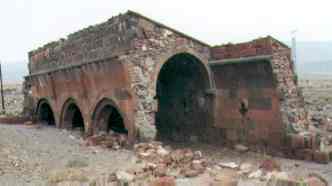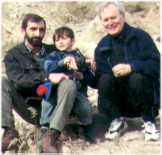|
Frank O'Hara in Armenia, November 1998
I helped develop a website; it's been updated over the years; the current website is www.tourismarmenia.org Saturday, October 31, 1998 - 9 AM I shower and check out my apartment - living room, bedroom, kitchen, bath – Spartan Soviet style but more than adequate. 10:30 AM 11 AM Noon Nearby is a bath house, dating from about 300 AD. Actually, it can still be identified as a steam bath. The change room has an inlaid stone floor with an interesting inscription in Greek, "We laboured hard and long on this floor and we were not paid." 1:30 PM The fishponds are actually owned by the local dentist who lives near the top of the hill. He invites us to have a meal with him and his family. We're on a sort of deck at the back of the house and I notice a chimney protruding form a corner. We are invited to see a "traditional" Armenian oven. Below the deck is a small room. In the middle of the room is a circular iron cover, about 3 ft. across. They remove the cover to reveal a well at least 6 ft. deep. At the bottom is a raging fire. They start to prepare shishkabob on the largest skewers I have ever seen. Presently a man comes along with a long pole. On the end of it is a sort of bent shovel. He proceeds to pull up the burning logs, leaving just the coals. It is fiercely hot inside the oven. I notice a sort of pad hung on the wall. It is about 4 ft. long and 30" across. They explain that the way they make their bread (unleavened) is to stick the dough to this pad in strips and then place the pad against the side of the oven. The resultant bread (called lavish, the standard bread of the country) is only about the thickness of one or two sheets of newspaper and about 12" wide by 20" long. They wrap food, such as roasted slices of sweet pickles, in it as a sort of sandwich. The dentist's wife and another woman have set a table about 12 feet long. It is loaded with food. We try the bread. Delicious. There is an interesting looking cake on the table too. We three Canadians are the only ones who don't eat any, wondering why they have put the dessert on the table ahead of the main course. They take the cake away as they serve the shishkabob; we find that Armenians eat their cake first! Two bottles of vodka appear and everyone is given a shot glass. Obviously, Armenians have picked up a custom from the Russians (or maybe the other way around). The dentist offers a lengthy toast. The abbreviated gist of it (as translated by Michael, our CESO local representative/guide/mentor) "When Armenia suffered the great earthquake of 1988 our country was devastated. Yerevan (a city of 1 1/2 million people) and the rest of the country had no electricity for two years. People from all over the world helped us and they are still helping us. Let's offer a toast to all of them and, in particular, to these three Canadians who are with us today." I offer a toast in return. Not as eloquent but suitably assisted by the vodka. Stanley, with his Ukrainian background, shows Gaston and myself how to knock back toasts. Gaston and I are adept pupils. We subsequently learned that the good doctor had built an electricity generator from retrieved parts, near where we had seen the fish ponds. This was for his own use but, with the earthquake, he extended the power to the nearby village. This was the only place for many miles around where lights could be seen at night, for more than a year following the earthquake. Stanley Dzuba's interpreter, an attractive young woman of about 21, sings a beautiful Armenian folk song. She has a delightful voice and simply starts to sing as if it were the most natural thing in the world. In this environment it is. The dentist introduces us to his two year old son who was born in the USA and he shows us the boy's passport to prove it. It turns out his wife was visiting relatives in the US when the child was born. Of course, this will give the child the option, when he is 18, to be an American citizen. However, the dentist points out that, although he has relatives in the US and could move there, he has chosen to remain in Armenia to help re-build his homeland. Late afternoon We proceed along a corridor, lighting our way with cigarette lighters. The lighters keep going out. Too hot to hold for long. We reach another room as large as the first. No light. One of our Armenian companions, Lazar, starts to sing in a rich baritone. He is joined by Gaston. A full bass. I join in with my weak baritone. No words; it doesn't matter. An aria from La Traviata, I think. The echo reverberates through my bones and my heart. I imagine Gregorian chants in such an environment. Night The moonlight casts a mysterious glow over the courtyard and the cells where the monks once lived and said their prayers. What an introduction to Armenia! November 12, 1998I'm coming to the end of my second week in Armenia and it's been a fascinating experience. I've visited several historic sites, been to the opera and put in a lot of work developing the two web sites. The people at the office are very friendly and kind and do everything they can to make my experience enjoyable and comfortable. The comfortable part is a bit of a challenge because they don't have central heating either in their homes or in their offices (at least not the one where I am) and the space heaters they use are not up to the job. However, other than my hands, I can simply put on enough clothes and I'm fine. A driver picks me up each day at lunchtime and takes me to my apartment where a nice woman (who speaks not a word of English or French) has a hot meal waiting for me. I'm really acquiring a taste for Armenian cuisine. She's a very good cook. I have given her a couple of very simple gifts and you should see how grateful she is! People here sure are not spoiled. My French has actually come in handy a few times. For example, I wanted to buy a bottle of local wine (reputed to be very good) but the storekeeper couldn't understand me and assumed as an "American" I would want to buy an expensive import. He finally took me next door where there was a fellow who spoke French. The bottle of wine (local) cost all of $1 US! Their top brands sell for about $3 US. Armenians have had an extremely difficult time of it since a major earthquake in 1988 and the breakup of the Soviet Union. Some people in the earthquake zone in the North are still living in tents after 10 years. In Yerevan, the capital city, where I am, conditions are nowhere near that bad now but they went without electricity for two years and then underwent a war with a neighbouring country. The city sure needs a coat of paint and some attention to the roads but it has a lot of potential. It is very well laid out. The apartment buildings are interesting inasmuch as the buildings are owned by the government and the individual apartments have been given to the people who were living in them. So the inside of the apartments, judging by mine, are basic but quite adequate. But the outside is disreputable, with no front door, wires hanging loose in the hallways and no lights at night. (I am told that the doors on buildings were used for fuel during the two years they were without electricity. Speaking of lights, the other night I went to the opera (surprisingly good and in an opera house that puts Toronto to shame. (The cost, by the way, is $2 US for a good seat.) I walked from my apartment. It took me, at the most, twenty-five minutes. I walked back and it took at least 40 minutes. The sidewalks are bumpy and what street lights exist are very high above the trees and very dim. Sometimes it was almost pitch black! I actually walked about a 1/4 mile past my apartment building before I realized I had passed right by it. I had heard that they have little crime on the streets. And I guess I proved it. I was warned about the cold weather here and I guess it is fairly cold in the winter but not by Canadian standards, -5 or so Celsius. The past couple of weeks it has reached up to +25c twice. They have an average of 333 days a year of sun; so it can get quite hot outside. However, the warmth doesn't penetrate into their stone buildings at this time of year. (I believe every building I have seen is made of stone blocks. They cut them from lava stone. The rock is called tuff. (I guess that's my first Armenian word. I find the language impenetrable.) The work I am doing is interesting. They have quite up-to-date computers but the telecommunications are very expensive and not very reliable. The company for whom I have been working actually paid to connect to their Internet Service Provider, who is only a couple of miles away, by radio telephone and satellite. I am developing two web sites - one for Armenian Tourism in general and one for a local tour operator. I'm also advising them on how to employ the sites effectively from a marketing standpoint (leads stored in a database for regular directed emailing and that sort of thing). As an interesting by-product I'm certainly learning a lot about Armenia. It's a fascinating country, especially if a person is interested in history, as I am. 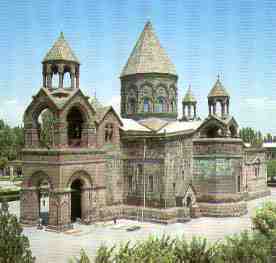
Last weekend I visited a church the original of which was built early in the fourth century to commemorate the conversion of Armenia to Christianity in 301, the first country to do so officially. We arrived in time to attend part of the mass. It was quite oriental - at least by my standards. Lots of ceremony, hundreds of candles and beautiful singing. The ceremony was obviously orchestrated when time was not a serious element in a person's life. However, as a stranger to the proceedings I found it fascinating. Afterwards, we visited a small museum, attached to the church (actually it's small a cathedral and the seat of the Armenian Apostolic Church). A priest was conducting a tour in English, much to my surprise. He took us below the church where there still exists the original altar from the very first church. Close by, in 1955, when they were upgrading the strength of the underpinnings in anticipation of putting in a new high altar, they discovered a sort of "eternal fire place". It was made of fired clay and had been covered over by an enormous rock. It is assumed that the first masses were said using this rock as the altar. I found it interesting that the pagan centre of worship is directly under the high altar of the present church. After the service we struck up a conversation with a Swiss man who was dressed in an outfit (sort of like a priest's robe) with a large cross on the front. It turned out that he is the recently arrived ambassador to Armenia from the Sovereign Military Order of Malta. I thought they were all eliminated in the middle ages. He spoke excellent English. It seems he had been a banker all his life and on retirement joined the order. He is looking to do good works in Armenia. (There's lots of opportunity.) A bit later we were joined by first one Anglican priest (from London England) and then by another from Toronto (believe it or not). None of them had been aware of the others but had joined us because they heard English spoken. The Toronto priest's first name was Phillip but I'm sorry to say, I have forgotten his last name. They are all accredited to the Armenian Apostolic church and helping out Armenia in its time of need - Christianity at work. As a result of our chance meeting, the three of them are going to get together to coordinate their efforts - synchronicity at work. Many places in Armenia go back to ancient times. As part of one of the web sites we will include an abbreviated history of the region. For people, like me, who are interested in history it should be helpful and for others, who skim it, at least they will get a smattering of a history that is important to this region and to humanity in general. For example, on the weekend I visited some sites that date from the days of the Silk Road.
Armenians put great stock in their culture. I was invited to a couple of concerts - one folk singing and dancing and the other chamber music. They don't neglect the old because of the new. Hopefully, some of my enthusiasm will transfer to the web sites and encourage people from all over the world to visit. There is much to see, the prices are outrageously low and the Armenians, who are universally kind and friendly, can use the income. I may have discovered the origin of the term "wetback". At the office, the toilets (they don't qualify as washrooms or restrooms, maybe as a WC) are the "hole in the floor" variety. My first experience with such. (Good thing I've strengthened my thigh muscles with Tai Chi.) In addition, there is only cold water and no soap and sometimes the water doesn’t run so then I dip my hands in a pail of water that is saved for the purpose. No towels, so I wipe my cold hands on the back of my jacket. Now I officially qualify as a "wetback". November 21, 1998It is 7 PM on Saturday afternoon and I'm still at the office. I have organized the two web sites and nearly finished one of them. This morning I gave a seminar on Marketing to the staff and tour guides. It went quite well, with a person doing simultaneous translation in Armenian. This was my first experience of hearing such an echo of my voice, let alone one that I can't understand at all. I think that this is a lot better way to experience a country than to be a tourist. And I still have the opportunity to do quite a number of "tourist" things. Besides visiting monuments, the countryside, etc. I've been to the opera, a concert of modern dance and modern music (excellent - well beyond my expectations), a children's concert where they try to act like American popular singers - no rock though, thanks for that - and a jazz club. I didn't bring enough reading material with me and have been unable to find even one newspaper in English or French. (It's surprising how many people here speak French.) Having no TV or radio to distract me and nothing else to read, I have read Buddhism for Non Believers again and am now almost through it for a third time. It is amazing how much I missed before. I wonder how many times I'll have to read it not to find something new. I have come around to liking more and more the straightforward agnostic Buddhist approach. One of the places we visited last weekend was an ancient church. They told a tale of when Tamerlane was attacking the town, one of the priests jumped off the cliff (do they ever have cliffs in this country!) He survived with just a broken finger. When Tamerlane found out about this he asked that the man be brought to him and demanded to know how he managed to survive. The good cleric naturally said, "My God saved me." Tamerlane was so impressed, and fearful of this obviously powerful god, that he said he would spare as many people from the town as could fit in the church. The townspeople crowded in - way beyond what the church would hold. When Tamerlane asked the cleric how this was possible the priest said, "They turned into doves and flew away." (Doves represent the Holy Spirit.) Later, when we were in the church, my host/tour leader took me alongside the altar into a small dark alcove and explained that there were extensive caves beneath the church. The entry was a small hole that was barely visible in the dark. It occurred to me that this must be the origin of the expression “having something dovetail”. Later still I went behind the church, which sits close to the edge of an enormous chasm. Just down from the top is a place that looks like an exit from the caves. Perhaps the Armenians made their way down the mountain. The drop is almost straight down and must be 1/2 mile deep. I can believe the Armenians would not be intimidated, though. They have an amazing lack of fear of heights. There were eight young trainee tour guides in our party. They all went right up to the edge as if it were a doorstep. One girl, and she is half Ukrainian, sat on a rock that was jutting out from the edge of the cliff. She did have a good view. She was as unconcerned about the precariousness of her position as if she were attending a movie. No one took any notice of her. Others were scurrying around like a bunch of mountain goats. There was a monastery associated with that church. The foundations still exist where the scribes copied manuscripts. Apparently, each person's output was 5 books per year and they could not do it for much more than three years before their health gave out. Armenia produced over 100,000 books this way, of which some 25,000 still exist and over 10,000 of them are in a special museum in Yerevan. 
One of the other experiences was visiting a tiny chapel, again perched on a precipice. Someone said, "Did you see the blood." I hadn't; so they took me over to the church step and showed me a fresh sprinkling of red stuff. It actually was blood. Someone had sacrificed a chicken, left its legs and head as proof and taken the rest home. They do this as an act of supplication, following walking around the church three times, going inside to make their request and then backing out of the door (everyone does that at every church). Then they cut the chicken in seven pieces, no more no less, and take it home to eat. One other thing - there was a pole in front of the church with probably over 100 pieces of cloth attached to it - rags, handkerchiefs, etc. (See the pole on the right of the picture. The people are my host Arkady Sahakyan and some of his trainee tour guides.) Apparently, people tie a ribbon to the pole and make a wish. One of the guide trainees did so in all seriousness and stood for a minute or so with her eyes closed. Oh yes, I backed out of the chapel door too. But I didn't put anything on the pole. They said that the chapel was built on the same place where a pagan temple had existed. One other thing - I was standing around with my hands in my pockets. My host came over to me and motioned that I shouldn't do that. (His English is very limited.) I don't know why he told me this. I wasn't jingling my change or anything. Since then I have been checking to see if any Armenian men put their hands in their pants pockets. I haven't seen one. Hands in windbreaker pockets seem to be OK. Each day a driver takes me home for lunch and picks me up - about 15 minutes each way. He also drives me home at night. When he misses other vehicles and pedestrians (who are all over the road) by centimetres I am unable to resist stepping on my virtual brake. My right leg must be getting stronger and stronger. After I went to the children's concert last Monday we met with the organizers of it. They invited me (visiting marketing guru) and my interpreter (the local CESO rep) to come to dinner the following evening to give them some advice about how they could market the country's Arts. The husband of the woman who runs the children's program is a quite well known sculptor and painter. They were the hosts and we had a fine evening, first talking about marketing and then eating their fine Armenian cuisine, liberally anointed with their fine local vodka. I am very impressed by the degree to which Armenians are handling a difficult economic situation. If I am any judge of character, they will pull themselves through successfully. I am proud that I have been able to play a small part in it. The couple who hosted our evening are well educated and sophisticated. They are not just trying to better themselves but their compatriots as well. Yet, they are obviously hard-pressed and live under strained circumstances. Imagine having to store water in your bathtub, for example, because the water supply is so unreliable and irregular. They didn't stint on their hospitality though. It was a lesson in the importance of the quality of people and not of their possessions. Michael, the CESO rep, insisted on walking me home. It should have taken a half-hour. However, Michael loves to talk and he does have some interesting tales to tell. The only problem is that Michael likes to be confident of his listener’s full attention. To secure this he arranged for me to face him. His technique was to stop in the middle of the sidewalk, forcing me to turn around, wondering why his voice was getting fainter. We then stood like this for some time while he finished describing another fascinating episode in his life. We would then walk a while only to have the same thing repeat. It must have taken at least a couple of hours to make it to my apartment. I learned a lot though. (In Armenia it is common for two men to walk arm in arm while carrying on an animated conversation. I guess Michael felt he couldn’t do this with me – especially in the dark.) A week ago Friday a friend of Arkady, my host/client, had a friend drop in to the office. He is in charge of the local Archaeological Institute. He invited us to come by at the end of the day so he could show me around. I'm quite interested in archaeology so I was looking forward to it. At 5:30 (getting dark) he called to inform us that we couldn't do it. The electrical utility had cut off their electricity. The government has no money. Even though the Institute's budget for the whole year is only $50,000 US, they couldn't even send him enough money to pay the electrical bill. And that 50K pays for all salaries, upkeep, etc. How fortunate we are in Canada. This epistle from the philistine is running on; however, I must tell you about one more episode, among the many I experienced. After we visited the (chicken sacrifice) chapel we drove to the bottom of the hill. The road was once part of the Silk Road. Anyway, there is a small stream with a stone bridge that dates back a thousand years. We stopped the minibus to look at the bridge. Alongside the bridge is a mill. I assumed it was one like in Canada, long since abandoned. But no, it is very much active. There are two rooms to the mill with a large grinding wheel doing its thing in each, driven by the water from the stream. In one room they do corn and in the other wheat. The mill is 500 years old and looks like it hasn't changed (except for the accumulated flour dust) in all that time. The woman and man tending the wheels were most gracious and pleased to show us around. Armenians uniformly, in my experience, are gracious people. I hope my assistance proves valuable to Arkady’s company and to Armenia in general. Certainly, from my standpoint, I got far more from the experience than I had anticipated. One of the sites I helped develop was to promote tourism in general in Armenia. The site has been considerably enhanced by the very capable local staff, particularly Karen Grigoryan. Click www.tourismarmenia.org if you are thinking of visiting Armenia or some adjacent countries.
Return to list |
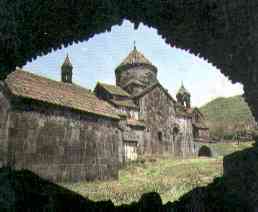
 We arrive at what looks like a
Greek temple. It is surrounded on three sides by deep chasms. The temple was
built in the early years of the CE and is on the site of more ancient Armenian
fortifications. A truly imposing and highly defensible location.
We arrive at what looks like a
Greek temple. It is surrounded on three sides by deep chasms. The temple was
built in the early years of the CE and is on the site of more ancient Armenian
fortifications. A truly imposing and highly defensible location.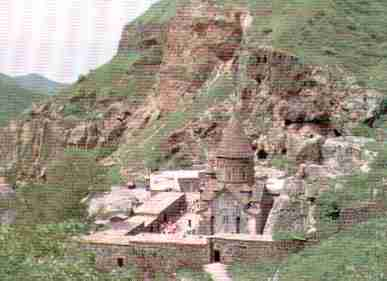 We travel through tortuous
mountain roads to an ancient monastery. It's at the end of a box canyon. A
short climb leads to a courtyard with a small church at one end. It's getting
dark. We enter the church. The only light is from votive candles. There are
very small windows on one side but none on the other. On the dark side are
couple of open doorways. We enter a doorway. We're now in a room that has been
carved out of the solid rock of the mountain. The room is round, about 60' in
diameter and at least 60' to the ceiling. There are carvings on the walls, and
the pillars look as if they were assembled in the conventional fashion but are
actually also carved entirely from the solid rock. There are a few votive
lights in this room. The next room has none.
We travel through tortuous
mountain roads to an ancient monastery. It's at the end of a box canyon. A
short climb leads to a courtyard with a small church at one end. It's getting
dark. We enter the church. The only light is from votive candles. There are
very small windows on one side but none on the other. On the dark side are
couple of open doorways. We enter a doorway. We're now in a room that has been
carved out of the solid rock of the mountain. The room is round, about 60' in
diameter and at least 60' to the ceiling. There are carvings on the walls, and
the pillars look as if they were assembled in the conventional fashion but are
actually also carved entirely from the solid rock. There are a few votive
lights in this room. The next room has none. 